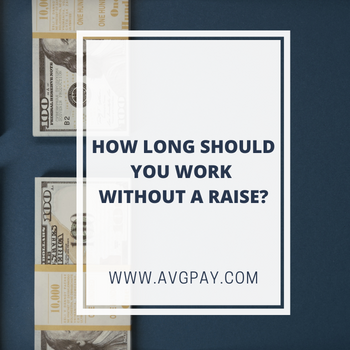Salary plays a vital role in any individual’s professional career. Sooner or later, the question will likely come up, “How Long Should You Work Without A Raise?”. Most employees will want to earn more money, whether due to Maslow’s hierarchy or perhaps just wanting progression. Recent statistics indicate that many Americans are choosing to quit to receive higher pay elsewhere. Therefore, it seems that many prefer quitting rather than waiting for a raise.
In this article, we’ll attempt to answer the question of how long you should work without getting a raise. We’ll consider specific timeframes, factors to consider, and other options available.
Importance of a raise

A salary raise is one of the best ways an employee can feel progression. It signifies that they are good at what they do and are rewarded accordingly. If an employee is financially motivated, they are more likely to perform better at their job.
Additionally, it’s well-known that all job roles have salary ranges. Take, for example, the job role of a Project Manager; the pay ranges from $90,257 to $222,319. With so much earning potential, an employee will want to achieve the higher end of the salary instead of staying in the same position with the same pay for many years. Likewise, professionals who select their careers are likely to do so because of their earning potential. As a result, they will always be seeking higher pay to achieve their dream.
How often should you be getting a raise?
While there is no specific amount of time, as every business and industry is different, there are a few things to consider.
Inflation rate/cost of living

Every year the inflation rate changes, and recently it seems just to be getting higher. As a result, you can expect the cost of living to also rise in relation to the inflation rate. Therefore, it stands to reason that your salary should also increase, at least in accordance with the inflation rate. For example, if the inflation rate is 3%, you should expect a raise of at least 3%.
Additional Responsibilities

Throughout an employee’s tenure, it becomes quite common to pick up additional tasks and new responsibilities, often without an immediate increase in salary. Although this is likely to add further pressure on the employee, adequate compensation isn’t guaranteed. Therefore, a salary raise request would be necessary if that is the case.
Performance Reviews

Many employees may be under the impression that performance reviews exist for the employer’s benefit. However, that is not the case. In fact, performance review results should be used as evidence when requesting a raise. Simply put, continuous improvement and positive job performance should be rewarded. Therefore use these performance reviews as the means to request a raise. If, for example, there have been three annual performance reviews, all of which have indicated a positive performance, yet no benefits or salary raise has materialized, it should be questioned.
Is it normal not to get a raise?
Sadly, some businesses may not provide regular salary increases. This can be for several reasons. Consider the following:
Company Performance / Structure

Some companies operate strictly with a budget in mind. This doesn’t just include the product or service they provide but also their employees. Each employee will have a price tag attached which is seen as an operating expense. Therefore, if a company is looking to maximize profits, it will hire employees and attempt to keep salaries the same each year. This allows them to earn more profit without losing out on revenue. Unfortunately, this is at the expense of the employee. It may be worth asking other employees to find out whether raises are typical within the business. This would also help answer your question of how long to work without getting a raise.
Timing

During periods of financial strain, such as a recession or the recent pandemic, which had a mass economic impact, salaries, and raises are usually the last thing companies are worried about. Instead, the main goal will be to save money. Therefore, if significant events threaten to affect the company’s profitability, it is unlikely that a raise will be provided. However, this will be the same for many others working similar jobs as wage stagnation will be commonplace. Therefore, you may have to work longer without pay raises until things return to normal.
How long should you work before getting a raise?
Now to answer the question of how long to work without getting a raise. The key here is to consider your professional career and resume as a whole. If your current employer is unable to provide a raise and you decide to look elsewhere, your resume will highlight how long you have been working there. If you’ve switched jobs multiple times over a short period of time, it may raise a red flag. The general consensus is that two years is adequate before leaving for another job. Therefore, if you haven’t received a raise after two years, it would be acceptable to begin looking elsewhere. This doesn’t mean that you shouldn’t ask for a raise during that period. In fact, if you have been working for more than a year, it may be time to ask for a raise.
Should I leave my job if I don’t get a raise?
Before deciding to leave a job, you should consider the job market. If plenty of opportunities are available elsewhere with more competitive salaries, then you should begin applying. However, don’t forget to think about the other benefits you may currently have and attempt to negotiate your salary before leaving.
Is it normal not to get a raise in 2 years?
It depends on a few factors, such as your industry and your company. To understand your situation better, consider speaking to colleagues or a senior manager to determine the business’s stance on salary raises. There may be a few hoops to jump through or other ways to get a raise that you may not be aware of. It also depends on how early in your career you may be. For example, some graduate programs may have yearly salary raises, whereas others provide a raise after the completion of the program.
Don’t be afraid to check out the job market as a whole to see how others are paid elsewhere. One way you can do this is through a site like ours – find your job role and compare your current pay with the salary data available. That should give you an indication as to how well-paid you are in comparison to market trends.
How Long Is Too Long To Wait For A Raise?
Looking at statistics, going for more than two years without a raise is too long. However, during that time, you should be able to find out how and what you need to do in order to secure a raise. Most employers will have a timeframe or initiative that deals with questions on how raises are handled. Although, there is no hard and fast rule required for employers to do so. However, it is worth requesting this information from senior managers or HR to get a better idea.
Make sure to keep aware of changes in the market. For example, during a recession, you may have to wait longer for a raise, but just having a job in those challenging times is more important than a salary raise issue.
What To Do If You Haven’t Had A Raise In A Long Time?
If you haven’t had a raise in a long time, then the first thing you should consider is speaking to a senior manager or HR. You can ask them about getting a raise and what needs to be done. It shouldn’t be seen as a difficult subject, as you’re well within your rights to ask.
Next, you should consider the job market and begin looking for jobs that can provide a higher salary bump. With enough experience, qualifications, and correct skills, you should have no problems finding a job elsewhere. In fact, statistics and research indicate that people who switch jobs are likely to receive higher pay, while those who remain at the same job will lose out compared to the inflation rate.
Bottom line
In conclusion, working for longer than two years without a pay raise is the maximum you should wait. For example, if inflation is 3% each year, then after two years, you stand to be down 6% compared to when you started. In comparison, you may receive a 10% pay increase immediately with a new job.
However, your first port of call should always be to ask your current job employer for a salary increase. It will be easier to get paid more immediately without going through interviews and probation periods elsewhere.
We hope you enjoyed this article and found it helpful. Be sure to browse our site to find out just how well your current salary stacks up against the national average.

